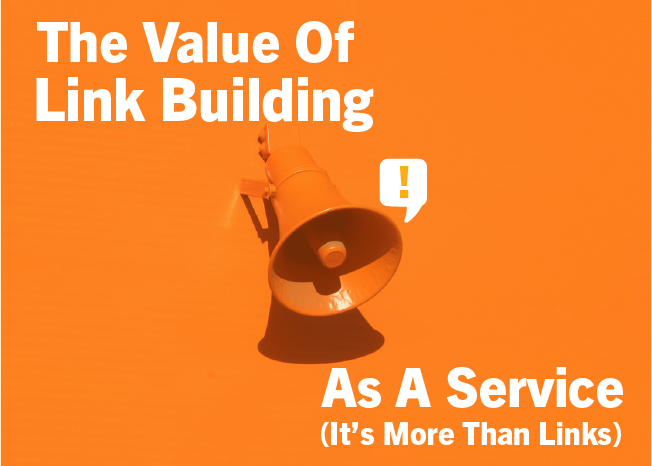Link building is strategic marketing, not a list of links.
“How many links will I get?”
— Every prospect in every link consultation, ever.
It makes sense—a link campaign without links is a failure. But the full value of link building as a service can’t be realized by a list of links alone.
Let’s be perfectly clear: no one contracts a link building or SEO agency for the sake of links alone.
Links in and of themselves aren’t valuable. It’s what the links represent (relationships and authority), and the results they achieve (rankings, traffic, conversions), that make links valuable.
If a link isn’t a true representation of authority and trust, then it probably won’t achieve the results you desire.

Authority and trust don’t spontaneously happen on the web: growing these relationships and securing links takes strategic marketing.
Intangibles of Link Building
I asked other reputable link builders from the industry what their thoughts were on the value of link building as a service, beyond a list of links.

Julie Joyce of Link Fish Media had this to say:
“Every year we do a labor analysis of how much time we tend to spend getting one link, and that's what we base our rates on for link development clients. We've only raised the rate once but I'm thinking of switching to another model simply because mine is outdated. So much goes into one link but by charging only when we succeed in getting one link, we're not able to devote the proper time to other activities that help build a successful link profile.
We might create relationships with 10 people and only secure one link, but later on down the road some of those webmasters we spoke with end up writing a new post and linking to our client. We might create some new customers for the client but there's no link...but there is still value there obviously.Just getting up to speed on a new account can take days. There are keywords to research, there is competitive analysis, there is a link audit.
In many cases we're building links alongside other teams, sometimes at cross-purposes, so we have to spend time keeping an eye on what everyone else is doing. I routinely spend hours and hours digging into link profiles and finding all sorts of crazy nonsense that needs to be taken care of before our efforts will pay off. That can be just as valuable as building a few good links.” — Julie Joyce, Director of Operations at Link Fish Media
David Farkas from The Upper Ranks provided insight as well:
“As every link builder knows, no outreach campaign has a 100% success rate. Especially when you're trying to build resource links, you're going to get people who say no, or just flat out ignore your emails.
But there's another type of success that can come from this kind of outreach. I'm sure you're well aware the importance of building relevant links. Since I'm reaching out to relevant sites, I often find that even webmasters and business owners that won't award a link, may reward something else.
I've had on numerous occasions a company webmaster ask if my client would like to become one of their ' vendors'. When I forward that email to my client, they immediately see more value in what I'm doing for them. And for my client, becoming another company's newest vendor might even be more valuable than a link.
When you do outreach right, you won't get a link out of every email-- but you will get a chance to build relationships on behalf of your client and add even more legitimate value to the service you're providing.” — David Farkas, Founder and CEO at The Upper Ranks
Our very own Cody Cahill of Page One Power also weighed in:
“To me, link building is more about the process than it is about the results. Sure the primary goal of a link building campaign is going to be acquiring links that move the SEO needle, but in my experience link building is less effective when this is the only objective. It can be very difficult to get clients to understand this.
The most successful link building campaigns are those that are fully integrated into a business’s diverse marketing and sales channels. Effective link building outreach will not only net you some valuable links, but it should also help to guide your content marketing efforts as you get feedback directly from potential linkers/sharers as to what they might want to see, and it helps inform you as to what type of content performs better from a linkability standpoint, as opposed to say, from a social shares perspective.
Link building in 2016 is about making connections with webmasters, publishers, and their audiences. Sometimes these connections will lead to links, more often they will not. But each is valuable in their own way. Sometimes this value will be in the form of something super tangible, like a direct sale.
Other times the value is in something subtle, like information that helps you guide your outreach approach next time.If you are doing it right, you should be learning or gaining something from your link building process regardless of how many links it earns you.” — Cody Cahill, Director of Content and Link Strategy at Page One Power
As a service we link builders struggle to encompass the value we provide, beyond the final product of links. How do you package the intangibles? If you’re not selling a list of links, what are you selling? A service.
The number of links obtained is only a piece of the service, and measuring that piece alone misses the bigger picture and overall goals of link building (rankings, traffic, conversions, etc.).

You’d never hire a PR firm to simply provide a list of press mentions, or content marketing agency to give you a pile of articles. These services offer much more value beyond their basic deliverables, and so too does link building.
The Work of Link Building as a Service
Links have fundamental value on the web, and numerous studies continue to show that links influence search visibility.
If you have a successful website, odds are you receive a considerable amount of traffic (and revenue) from organic search—link building will help you capture more organic traffic.

As Julie stated, creating a link building campaign takes considerable “background” work.
Any good link building campaign involves much more than just “building links”, much the same as any PR campaign will exceed the work of creating “press coverage”.
You wouldn’t ask a PR agency to secure press mentions the moment you hire them for a campaign, simply by immediately emailing all of their press contacts.
More than likely, that would result in disaster—for both you and the PR firm.
Link building agencies can’t build links simply by emailing everyone with a worthwhile website in your industry, the moment you sign a contract.
Link building firms need to be strategic and develop a comprehensive strategy, using a variety of tactics. This will often include content creation in some form. Here’s some of the typical background work that happens during a link building campaign:
- Site assessment.
- Competitive analysis.
- Industry/niche research.
- Audience development.
- Relationship/partnership building.
- Brand research.
- Marketing collaboration.
None of this work is directly relatable to a “link acquired” moment, but each piece is needed in order to successfully secure links.
Let’s look at each of these intangibles individually.
1. Site Assessment
First and foremost, as a link building firm we need a clear picture of the health of your website.
Before building a link we must be sure the links we acquire will actually be impactful—which means looking at your backlink profile, on-page, and technical SEO.

Technical/on-page issues hinder link campaigns (not to mention your organic traffic), and the technical aspects of your site need to be optimized before you start pursuing links.
The the health of your backlink profile will also impact any future links. Depending on your past link building efforts, there could be potential problems (toxic links, oversaturated anchor text, etc.) lurking in your profile that need addressed. A qualified link building agency should include a link audit in their service to diagnose these issues and take appropriate action, prior to building links.
2. Competitive Analysis
Recognizing, analyzing, and understanding your competition is important to all facets of business.
While you may have a solid understanding of your competitive landscape, search is often another story.
As link builders we need to analyze:
- The major search competitors and their important keywords.
- Competitors’ successful strategies, content, and tactics.
- Relevant link opportunities via competitor backlink portfolios.
- Strengths and weaknesses of niche link tactics.
An intimate understanding of your competition will help us improve your search performance to outpace and outperform your competitors in the search results.
3. Industry/Niche Research
Analyzing the competition is the first step in industry research, but not everyone important in your niche will be a direct (search) competitor. To perform true niche analysis, link service providers dig deeper.

To secure the best links an agency will identify influential people and websites in your niche. While it may take time to acquire links on top industry sites, identifying and analyzing them is the first step. This analysis can come in handy during other promotional efforts as well.
Niche research also unearths which topics are popular and existing content gaps. This knowledge informs which content initiatives will resonate with your audience, and which content can be promoted for links.
4. Audience Development
Building relevant links requires an understanding of your audience.

Part of the link building research process involves understanding your audience, how they’re searching for your product or services, and where they live online.
This empowers both link prospecting and link outreach. First, link builders can find sites that have audience overlap. Then, they can outreach effectively, positioning your site in a way that speaks to the value to your shared audience.
Links will also tap into new audiences. A link building service will give you new insight into where your audience exists online, and how you can reach them effectively.
5. Relationship/Partnership Building
The lasting relationships and partnerships built during link acquisition can lead to opportunities beyond increased keyword rankings or traffic growth.
Link builders must be conscientious of relationships and partnership opportunities during the course of a campaign. The connections made during link acquisition can often lead to real-world partnerships extending value to other portions of your business, and a link builder must always be aware of the potential beyond a link.
It’s also important an agency has a list of “do not contacts” (DNCs) to know where partnerships are already present.
As David Farkas noted above, even when a link is not secured, it’s still possible to build a positive relationship that can pay dividends in other ways.
Building links the right way cultivates positive relationships and build a network of allies across your industry.
6. Brand Research
All marketing influences branding, including link development.
The impact of links on branding is three-fold:
- Awareness
- Authority
- Affinity.
Link agencies must understand your brand inside and out (audience, competitors, product/service, USP, etc.) to successfully build links. Securing links means promoting the value of your site to other site owners; it’s impossible to communicate value without a firm understanding of your brand.
Brand exposure increases in both search and the web as you secure links.
Links also bolster brand authority. Real links are an endorsement from one site to another—a site owner only links if they’re willing to recommend your site to their readers.
Link acquisition naturally builds brand affinity. Positive interactions foster brand advocates, and endorsements from popular sites transfer affinity and respect to your brand and site.
7. Marketing Collaboration
Link builders need to be aware of (and collaborate with) other marketing.
Knowledge of other campaigns avoids redundancy and improves campaign efficacy. Links are part of the digital marketing equation, and link builders need to be cognizant of other ongoing strategies. Oftentimes, other marketing campaigns can lead to important link opportunities.
Links also support other marketing initiatives and campaigns.
Content marketing and PR campaigns experience improved visibility and efficacy when coupled with link building. Links broaden the reach of these campaigns and help provide the momentum that separates success from failure.
Links should be a consideration across all digital marketing campaigns because they are so valuable online.
The Importance of Expertise
Securing a handful of decent links might be possible, but designing a sustainable campaign requires expertise, research, analysis, and strategy.
Link building is nuanced, human-focused endeavor. It’s a time-consuming and labor-intensive practice.
In 2016 everyone can have a platform on the web. Link builders target those with important platforms in your industry, not just media outlets (although they certainly don’t ignore media opportunities).
Much the way PR firms need a coordinated strategy to secure positive press, link building firms need compelling value to secure links.
It takes a trained eye to recognize the appropriate opportunities, and experience to turn those prospects into even more opportunity.

Successful link acquisition is predicated on effective human-to-human communication.
Link building firms have considerable value to offer beyond links. Today, link building is more akin to marketing than ever before. It’s our job as link building service providers—and all SEO agencies—to continue to push the evolution and growth.
Link building isn’t a list of links. It’s a nuanced service that requires care, expertise, psychology, sales, and a strong understanding of the market.
It’s our job to make sure we live up to this responsibility, and continue to educate clients.

